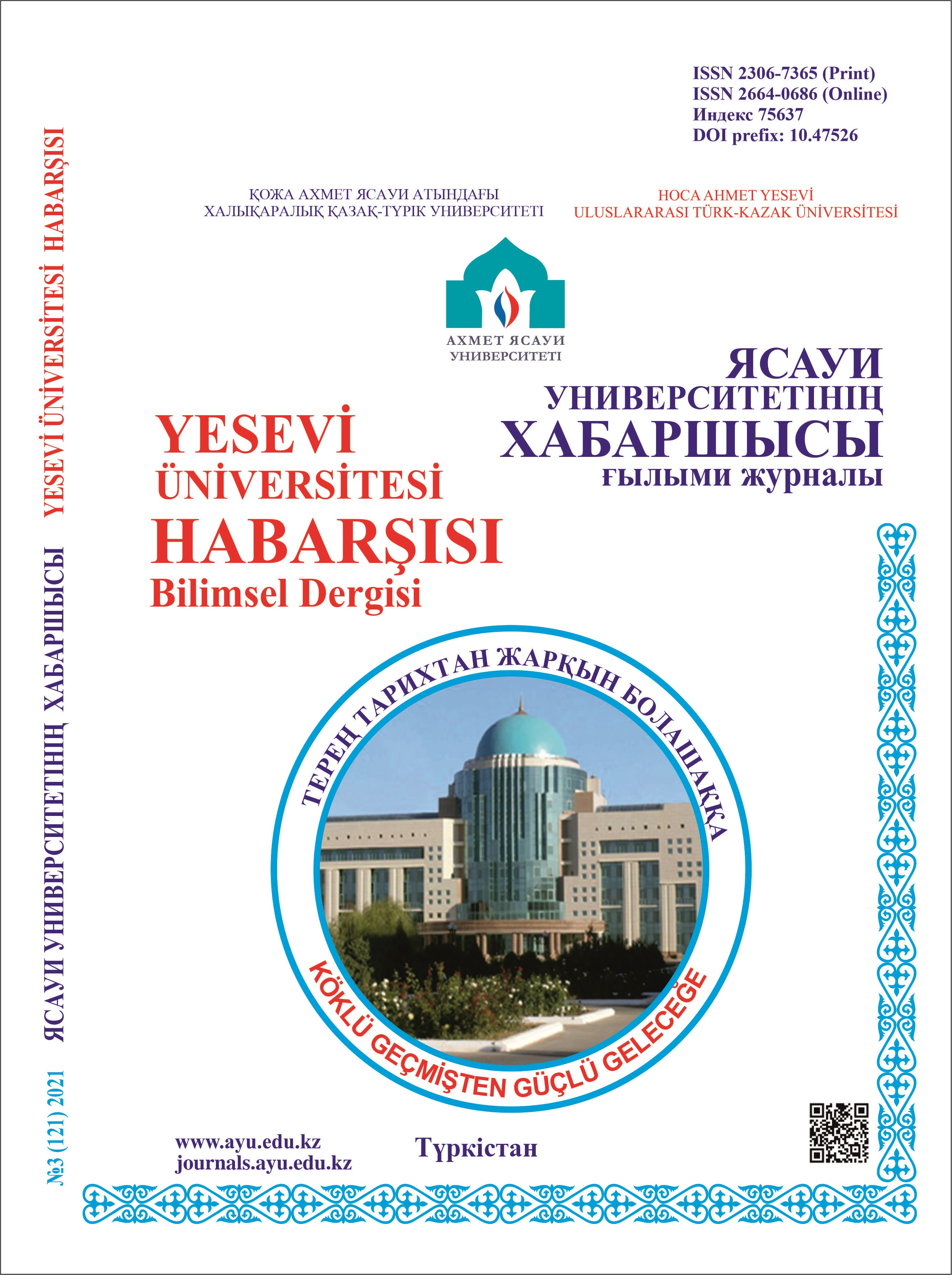Эффективность применения информационных технологии в процессе профессиональной подготовки педагога-музыканта
179 173
Ключевые слова:
музыка, учитель, дистанционное обучение, технология, музыкальный инструмент, мастерство, практика.Аннотация
В статье рассматривается использование информационнокоммуникационных технологий в процессе инструментальной подготовки будущих педагогов-музыкантов на основе дистанционного обучения. Важность дистанционного обучения для нас заключается в повышении уровня профессиональной инструментальной подготовки обучающихся через создание единой информационной системы образования. Целью данной статьи является обобщение опыта применения дистанционных технологий в преподавании специальных дисциплин в контексте профессиональной подготовки будущего учителя музыки и анализ их эффективных возможностей в данном аспекте. В исследовании
Библиографические ссылки
Burt J. Cisco says mobile traffic will grow eightfold by 2020. EWeek. 2016. [Electronic resource]. URL:
http://www.eweek.com/networking/cisco-says-mobile traffic-will-grow-8-fold-by-2020.html (date of access
05.2023)
Әлқожаева Н.С., Төлешова Ұ.Б. Жоғары мектептің оқу үрдісінде педагогикалық технологияларды
қолдану: оқу құралы. – Алматы: Қазақ университеті, 2009. – 126 б.
Роберт И.В. Теория и методика информатизации образования (психолого-педагогический и
технологический аспекты). – М.: БИНОМ. Лаборатория знаний, 2014. – 398 с.
Aguilar Carla E., Dye Christopher K. Developing Music Education Policy Wonks: Preservice Music
Education and Policy // Journal of music teacher education. – 2020. – Vol. 29. – Issue 2. – P. 78–88.
Соломин В.П. Использование социальных сетей интернета в преподавании естественнонаучных
дисциплин // Universum: Вестник Герценовского университета. – 2009. – №7. С. 99–103.
Горбунова И.Б., Заливадный М.С., Хайнер Е. Музыкально-компьютерные технологии как
информационно-трансляционная система в школе цифрового века // Вестник Орловского
государственного университета. Серия: Новые гуманитарные исследования. – 2014. – №4 (39). Б. 99–
Matthews D. How will technology reshape the university by 2030? [Electronic resource]. URL:
https://www.timeshighereducation.com/features/how-will-technology-reshape-university-2030. (қаралған
күні: 14.09.2023).
Король А. Дистанция в образовании: от методологии к практике // Наука и инновации. – 2020. – №6
(208). – С. 22–29.
Кенжебаева А.Т., Сансызбаева Д.Б., Касымова Г.К. Психолого-педагогические условия
формирования межкультурной компетенции у студентов // Ясауи университетінің хабаршысы. –
– №1(123). – Б. 92–101. https://doi.org/10.47526/2022-1/2664-0686.08
Schleicher A. Education disrupted – education rebuilt: Some insights from PISA on the availability and use
of digital tools for learnin // OECD Education and Skills Today [Electronic resource]. URL:
https://oecdedutoday.com/coronavirus-education-digital-tools-for-learning (date of access 22.04.2023)
Монахов В.М., Тихомиров С.А. Эволюция методической системы электронного обучения // Яросл.
пед. вестн. – 2018. – №6. [Электронный ресурс]. URL: https:// cyberleninka.ru/ article/n/evolyutsiyametodicheskoy-sistemy-elektronnogo-obucheniya (дата обращения 08.06.2023)
Klein P., et al. Classical Experiments revisited: Smartphone and Tablet PC as Experimental Tools in
Acoustics and Optics // Physics Education. – 2014. – №49 (4). – Р. 412–418.
Куздеубаева А.Б., Айсина С.Т., Жакаева К.А. Формирование профессиональной компетентности
будущего учителя музыки в процессе изучения дисциплины «Основной музыкальный инструмент –
фортепиано» // Ясауи университетінің хабаршысы. – 2023. – №2 (128). – Б. 239–250.
https://doi.org/10.47526/2023-2/2664-0686.19
Burt J. Cisco says mobile traffic will grow eightfold by 2020. EWeek. 2016. [Electronic resource]. URL:
http://www.eweek.com/networking/cisco-says-mobile traffic-will-grow-8-fold-by-2020.html (date of access
05.2023)
Alkojaeva N.S., Toleshova U.B. Jogary mekteptіn oqu urdіsіnde pedagogikalyq tehnologiyalardy qoldanu
[The use of pedagogical technologies in the educational process of Higher School]: oqu quraly. – Almaty:
Qazaq universitetі, 2009. – 126 b. [in Kazakh]
Robert I.V. Teoria i metodika informatizacii obrazovania (psihologo-pedagogicheski i tehnologicheski
aspekty) [Theory and methodology of informatization of education (psychological, pedagogical and
technological aspects)]. – M.: BINOM. Laboratoria znani, 2014. – 398 s. [in Russian]
Aguilar Carla E., Dye Christopher K. Developing Music Education Policy Wonks: Preservice Music
Education and Policy // Journal of music teacher education. – 2020. – Vol. 29. – Issue 2. – P. 78–88.
Solomin V.P. Ispolzovanie socialnyh setei interneta v prepodavanii estestvennonauchnyh discipline [The use
of social networks of the Internet in the teaching of natural sciences] // Universum: Vestnik Gercenovskogo
universiteta. – 2009. – №7. S. 99–103. [in Russian]
Gorbunova I.B., Zalivadnyi M.S., Hainer E. Muzykalno-kompiuternye tehnologii kak informacionnotransliacionnaia sistema v shkole cifrovogo veka [Music and computer technologies as an information and
translation system in the school of the digital age] // Vestnik Orlovskogo gosudarstvennogo universiteta.
Seria: Novye gumanitarnye issledovania. – 2014. – №4 (39). Р. 99 – 103. [in Russian]
Matthews D. How will technology reshape the university by 2030? [Electronic resource]. URL:
https://www.timeshighereducation.com/features/how-will-technology-reshape-university-2030. (date of
access: 14.09.2023)
Korol A. Distancia v obrazovanii: ot metodologii k praktike [Distance in education: from methodology to
practice] // Nauka i innovacii. – 2020. – №6 (208). – S. 22–29. [in Russian]
Kenjebaeva A.T., Sansyzbaeva D.B., Kasymova G.K. Psihologo-pedagogicheskie usloviia formirovaniia
mejkulturnoi kompetencii u studentov [Psychological and Pedagogical Conditions for the Formation of
Intercultural Competence in Students] // Iasaui universitetіnіn habarshysy. – 2022. – №1(123). – B. 92–101.
https://doi.org/10.47526/2022-1/2664-0686.08 [in Russian]
Schleicher A. Education disrupted – education rebuilt: Some insights from PISA on the availability and use
of digital tools for learnin // OECD Education and Skills Today [Electronic resource]. URL:
https://oecdedutoday.com/coronavirus-education-digital-tools-for-learning (date of access 22.04.2023)
Monahov V.M., Tihomirov S.A. Evoliucia metodicheskoi sistemy elektronnogo obuchenia [Evolution of the
methodological system of e-learning] // Iarosl. ped. vestn. – 2018. – №6. [Electronic resource]. URL:
https://cyberleninka.ru/article/n/evolyutsiya-metodicheskoy-sistemy-elektronnogo-obucheniya (date of
access 08.06.2023) [in Russian]
Klein P., et al. Classical Experiments revisited: Smartphone and Tablet PC as Experimental Tools in
Acoustics and Optics // Physics Education. – 2014. – №49 (4). – Р. 412–418.
Kuzdeubaeva A.B., Aisina S.T., Jakaeva K.A. Formirovanie professionalnoi kompetentnosti budushego
uchitelia muzyki v processe izucheniia discipliny «Osnovnoi muzykalnyi instrument – fortepiano»
[Formation of Professional Competence of a Future Music Teacher in the Process of Studying the Discipline
«The Main Musical Instrument is the Piano»] // Iasaui universitetіnіn habarshysy. – 2023. – №2 (128). –
B. 239–250. https://doi.org/10.47526/2023-2/2664-0686.19

